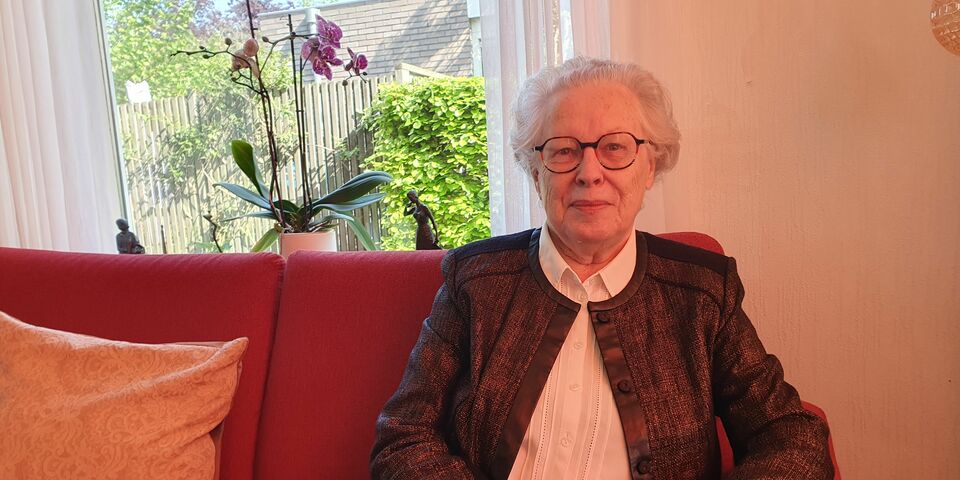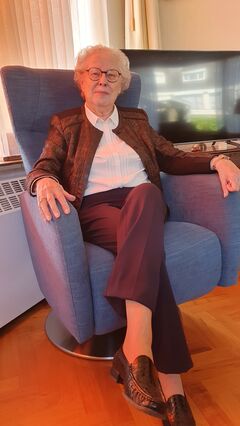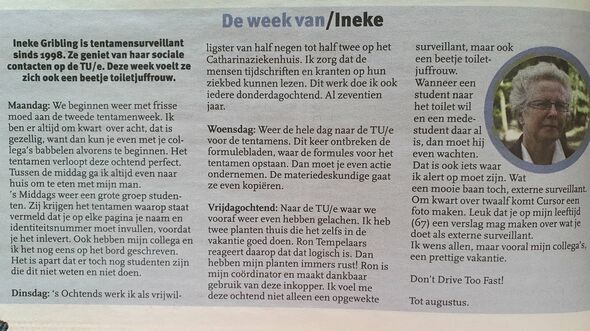For the past 26 years Ineke Gribling has been watching students do their exams
At the age of 82 Ineke Gribling still enjoys going to work. What does she do? She's an invigilator at TU/e. It's not a job that makes her rich, but it does make her happy. Over the years, she has seen the role become more professional, she has seen the advent of computers and special exam facilities. These days she gives her instructions in English. She has no plans to stop anytime soon.
On seven afternoons during this past exam period you would have found Ineke Gribling in the Auditorium, Vertigo and Fontys' building S3. She was tasked with keeping a watchful eye, ensuring that no students sneaked a glimpse of another's work or passed on any kind of sign. She works sitting down, walking (the soles of her shoes make no sound) and watching. Nothing escapes Ineke's notice. Especially whether all student eyes are focused on their own exam paper.
Going about her work, Ineke is always friendly, but she requires students to strictly observe the rules, which are as follows: “1: You must carry some form of ID and if you've forgotten it, you have to be able to get it within 15 minutes. If you can't, you can't start the exam. 2: You are allowed to arrive no more than 15 minutes late.” There was a quite a rumpus about the last rule this past quartile. For Ineke, the first rule brings to mind her back door at home. “There used to be a piece of paper stuck to it at eye level, back when my son was studying business administration. In big letters was written: don't forget student card. Now I know why.”
16 minutes late
The exam at which the rumpus occurred was held in the canteen in Fontys' building S3. Sixteen minutes after the exam started, a student from New Zealand arrived in a stressed state. It had taken him forever to find the building. “My fellow invigilator and I discussed the matter with Ron and Hans.” Ron Tempelaars has been TU/e’s exam coordinator since 2009, Hans Leermakers is his right hand during exams. Ineke continues: “They left the decision to us. And then I saw that my watch was one minute ahead of theirs. So, in fact, we were talking about 15 minutes. The deciding factor in admitting the student was that the material expert (the lecturer present at the exam, ed.) had already complained about how difficult it was to find the exam hall.”
Students know Ineke, ”they know that when I ask for their strikdiploma (a child's certificate for tying their shoelaces, ed.), I mean their ID. They also recognize her off campus. “I'm sometimes greeted by a student when I'm at the market.”
For this Cursor article, I visited Ineke at her home, “nice and close to TU/e”, and here too I notice her strict timekeeping. “Is it nine thirty now? Then that clock's wrong!” and she immediately puts it back one minute. For the record, I didn't arrive late. I wouldn't dare.
130 invigilators
For TU/e students to graduate, exams have to be passed. No invigilators, no exams. Ineke is one of the 130 invigilators who are involved in getting technical graduates on to the job market. At the age of 82 she isn't the youngest, that honor goes to 52-year-old Vera Lardinois. Nor is she the oldest, that's Henk van Rooij, aged 89. Many invigilators have had interesting careers. In his group, Tempelaars has a string of former professionals: soccer player, member of the tax authority's fraud squad, nurse, optometrist, ex-military folk and lawyers.
Ineke trained as a radiographer in Radboud Hospital in Nijmegen. When she married, she was required by law to stop work. After 25 years of volunteering at Catharina Hospital, she saw an advertisement in a local paper. “TU/e was looking for invigilators. That was in 1998. I only heard later on that it was paid work. During the interview, which was with Picavet, the coordinator before Ron, my only concern was whether the job meant standing up for three hours. But no, it's sitting, walking and watching.”
More professional
A great deal has changed in the 25 years that Ineke has been attending exams. The coordinator has gained two colleagues in order to manage the big changes: the digital exams (Jesse Cohen) and the special facilities (Sandra Galante). Ineke: “For computer-based exams we're required to make sure that no other pages appear on the screen. These days we often have exams for just a handful of students. And sometimes it's just one student, someone who gets extra time. Even then we work with two invigilators. In case one of us is inconvenienced. That mustn't stop the exam going ahead.”
One task that hasn't changed is accompanying students to the bathroom. “We check the stalls too. I've not seen it myself, but snippets of paper have been found behind the cistern, or formulas written on the mirror.”
In the exam hall Ineke is chiefly occupied with the direction of the students' gaze. “But I watch discreetly, so that it doesn't show. And if I have my suspicions, I'll move a student.”
As long as Ineke continues to enjoy invigilating and provided her role as carer for her husband allows it, she will be available five times a year to work during TU/e's exam weeks. And no dental appointment or coffee date will get in the way. “I still enjoy being around young people. I enjoy going to work, and I enjoy coming home. I never complain. If I complain, it's a sign that I'm ill.”




Discussion